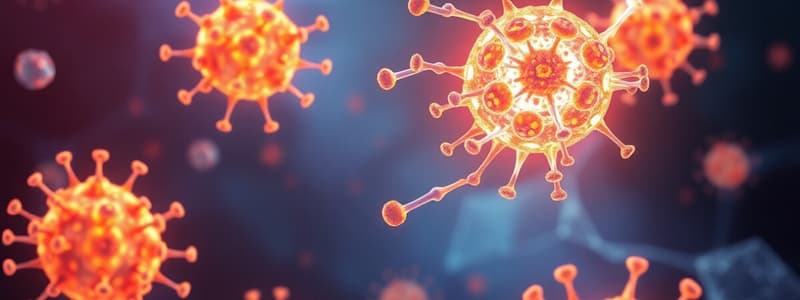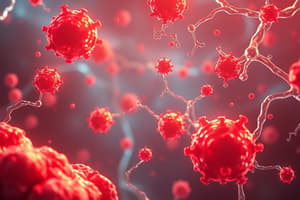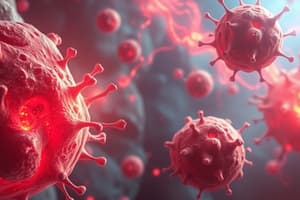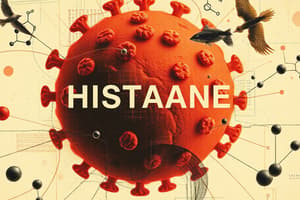Podcast
Questions and Answers
Which receptors are primarily involved in the inflammatory response?
Which receptors are primarily involved in the inflammatory response?
- H1 and H2 receptors
- H3 and H4 receptors
- H1 and H4 receptors (correct)
- H2 and H3 receptors
H1 receptors are mainly found on immune cells only.
H1 receptors are mainly found on immune cells only.
False (B)
What are two common triggers of anaphylaxis?
What are two common triggers of anaphylaxis?
Peanuts and insect stings
Antihistamines block histamine receptors on tissues, thus reducing the effect of __________ and the resultant allergic symptoms.
Antihistamines block histamine receptors on tissues, thus reducing the effect of __________ and the resultant allergic symptoms.
Match the following anaphylaxis triggers with their categories:
Match the following anaphylaxis triggers with their categories:
What is the main function of histamine in the inflammatory response?
What is the main function of histamine in the inflammatory response?
Heparin promotes blood clotting at the injury site.
Heparin promotes blood clotting at the injury site.
What type of cells are mast cells primarily involved with in inflammation?
What type of cells are mast cells primarily involved with in inflammation?
____ is a mediator involved in the dilation of blood vessels and contributes to pain during inflammation.
____ is a mediator involved in the dilation of blood vessels and contributes to pain during inflammation.
Match the chemical mediators of inflammation to their descriptions:
Match the chemical mediators of inflammation to their descriptions:
What role do neutrophils play during the inflammatory response?
What role do neutrophils play during the inflammatory response?
The four types of histamine receptors are: ____, ____, ____, and ____.
The four types of histamine receptors are: ____, ____, ____, and ____.
Macrophages are primarily responsible for secreting factors that promote blood clotting.
Macrophages are primarily responsible for secreting factors that promote blood clotting.
What is the first line of treatment for an anaphylactic reaction?
What is the first line of treatment for an anaphylactic reaction?
Anaphylaxis can occur slowly over several hours.
Anaphylaxis can occur slowly over several hours.
Name one symptom of anaphylaxis.
Name one symptom of anaphylaxis.
Epinephrine may be administered via the ________ route as the preferred method of treatment.
Epinephrine may be administered via the ________ route as the preferred method of treatment.
Match the symptoms of anaphylaxis with their descriptions:
Match the symptoms of anaphylaxis with their descriptions:
Which of the following conditions is NOT typically associated with an inflammatory response?
Which of the following conditions is NOT typically associated with an inflammatory response?
Autoimmune disorders involve the body misinterpreting its own tissues as harmful.
Autoimmune disorders involve the body misinterpreting its own tissues as harmful.
Name two examples of autoimmune responses involving inflammation.
Name two examples of autoimmune responses involving inflammation.
Patients with mild alterations may need palliative care, rest, and reminders related to safety and ________ prevention.
Patients with mild alterations may need palliative care, rest, and reminders related to safety and ________ prevention.
Match the following conditions with their inflammatory component:
Match the following conditions with their inflammatory component:
Flashcards are hidden until you start studying
Study Notes
Mediators of Inflammation
- Mast cells are key players in inflammation, located in tissues like skin, respiratory system, and intestines.
- Histamine and heparin are major inflammatory mediators released by mast cells.
- Histamine causes vasodilation and increased vascular permeability, while heparin prevents blood clotting.
- This combined action allows blood to easily reach the injured site, leading to the redness (erythema) and swelling associated with inflammation.
Inflammatory Cells
- Blood platelets release clotting proteins at the wound site.
- Mast cells secrete factors that regulate blood vessel dilation and constriction.
- Neutrophils kill/degrade pathogens and secrete factors to remove them by phagocytosis.
- Macrophages also phagocytize pathogens and secrete cytokines that attract immune cells and aid in tissue repair.
Histamine Receptors
- There are four types of histamine receptors: H1, H2, H3, and H4.
- H1 and H4 receptors are involved in the inflammatory response.
- H1 receptors are primarily found on smooth muscle cells, endothelium, and the central nervous system.
- Stimulation of H1 receptors causes vasodilation, bronchoconstriction, pain, itching, and hives.
- H4 receptors are located in peripheral white blood cells (WBCs) and mast cells, contributing to immune responses.
Anaphylaxis
- Anaphylaxis occurs when a rapid release of inflammatory mediators, such as histamine, is triggered by an allergen.
- Untreated anaphylaxis can lead to death due to airway obstruction or vascular collapse.
- Common triggers of anaphylaxis include food allergies (peanuts, shellfish, milk, eggs), insect stings, medications (penicillin, anesthetic agents, NSAIDs), and latex.
Anaphylaxis
- Life-threatening allergic reaction.
- Rapid onset: seconds to minutes.
- Immediate emergency medical system (EMS) activation.
- Signs and symptoms:
- Airway inflammation, throat swelling (potential airway blockage)
- Wheezing, labored breathing
- Abnormal heart rhythm
- Low blood pressure
- Weakness, light-headedness, dizziness
- Nausea, vomiting, or diarrhea
- Cyanosis (decreased tissue oxygenation) or pallor (shock)
- Hives, itching
- First-line treatment: Epinephrine
- Dilates bronchi to improve airflow.
- Constricts blood vessels to raise blood pressure.
- Counteracts negative effects of the allergic response.
- Administration:
- Intramuscular (preferred)
- Subcutaneous, intraosseous, or intravenous
- Auto-injectors: Adrenaclick, Auvi-Q, EpiPen.
- EMS call: Essential even when auto-injector is used.
- Airway protection: Critical during and after anaphylaxis.
- Adjunctive medications: beta-agonists, antihistamines, corticosteroids.
- Severe laryngeal swelling: May require tracheotomy.
### Inflammation
- Can occur in any part of the body
- Many diseases involve inflammation such as allergies, autoimmune diseases, and infections.
- Autoimmune diseases occur when the body mistakenly attacks its own tissues
- Some examples of autoimmune diseases include psoriasis, rheumatoid arthritis, lupus, and Guillain-Barré syndrome.
- Inflammation can cause complications for patients, especially those with infections
- Mild inflammation may only require simple care, rest, and safety precautions.
- Infections require treatment as acute inflammation can lead to further complications.
Studying That Suits You
Use AI to generate personalized quizzes and flashcards to suit your learning preferences.



